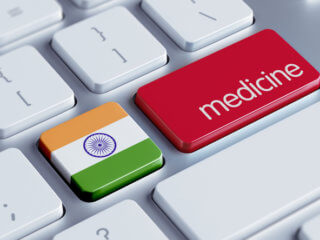Large multinationals and their role in digital health India is witnessing a massive expansion. Health care is one of the fastest growing sectors of the universal economy, and the growth is mainly due to the increase in Internet connectivity, innovations and favorable initiatives taken by the government of India supporting digital health. The world’s major territories are expected to see health care expenditure increments from 2.4% to 7.5% between 2015 and 2020.
This rise is driven by the needs of aging & maturing populations, the frequency of chronic disorders, growing market expansions, infrastructure advancements and progress in care and technology. At the same time, there is a rise in demands for affordable services to maximize savings. Remote patient monitoring services considerably drive the market growth due to the ability to supervise ailments from a remote location.
Advancing innovation is essential in the current scenario. The new outcomes due to 3D printing, rooted devices, and other digital advancements have yielded reduced costs. Also, the stakeholders have numerous opportunities in big data analytics and new R&D methods. Digital health society consists of inventive, persistent and ardent pioneers who recognize it is not about us, it is not about the technique & technology. It is not about wealth, it’s about the impact. Healthcare stakeholders should consider making ecosystems that contain open-minded players and roots of knowledge outside their own four walls.
| Recommended for you | |
| 26 key people in digital health India | |
| 7 Key market segments of digital health in India | |
| Digital health India: A guide to startups, finance, markets |
Digital health global initiatives by big players
- Google: Google, world’s widely used search engine has always supported digital innovations where technology liberates a wave of new possibilities or opportunities. Google is contributing in various sectors like banking & payments, skill programs, healthcare and press (DNI fund).
Google is starting a new initiative called Google Lens. Google Lens is set to technology that incorporates Google’s search engine with your smartphone camera. It can also get details from Google Maps and Google My Business. Once you take a picture of restaurant or movie theatre, you can check its review, contacts, hours of operation etc. It acts as a Google assistant. [1]
Indian focus: Google India and Information technology ministry have pitched several initiatives to fulfil the vision of Digital India. The relevant fields covered under this initiative are digital payments and digital skill. With growing number of smartphone users in India, Google believes India has talent & potential to become a leader in mobile application technology. Hence, Google has announced an Android Skill program to educate 2 million developers in India. [2]
A digital payment is another program undertaken by Google and ministry for securing e-payments, and it is being planned in collaboration with Data Security Council. The program brings all stakeholders from systems like Banks, Private companies, and Government. - Apple: Apple Health: Apple has launched its latest mobile operating system (iOS8) a new application called Health. Health app allows you to save a broad range of information about your health and wellness, giving you a distinct place to log health information and see how it varies over time.
You can prefer which information should be saved in the health apps and which other apps can access it. Your health & fitness information is encrypted with the fingerprint sensor or passcode when it is locked.
Apple ResearchKit: ResearchKit is a model launched by Apple which enables developers & researchers to make robust applications for medical study. [3] It is a reliable tool that helps medical research professionals to assemble health data from various iPhone users. You can take part and allow your data to be used in critical studies. - IBM Watson: IBM Watson health provides practical solutions to improve patient experience, improve operations, and control the health of citizens. [4]
Watson Health focuses on empowering leaders, stakeholders, and authorities in health through support which assists them to achieve extraordinary outcomes, make vital connections and gain confidence in an attempt to solve the biggest challenges in healthcare.
Indian Focus: India is an important marketplace for us, said IBM Watson, GM David Kenny. IBM is placing big stakes in Indian market with its experimental platform of artificial intelligence, based on factors like abundant talent pool and rise in growth for accepting technology products and solutions.
AllizHealth, a Pune based startup uses IBM cloud platform which permits consumers to track various health menaces and parameters, store digitized information and also to connect with physicians.
IBM is also working with hospitals for enabling Watson platform for oncology to assist physicians along with a current initiative to push developer’s skills and promote their careers around cloud computing. IBM’ DeveloperConnect focuses on linking more than 10, 000 developers across India virtually. - Philips: Phillips is in leading spot in medical technology, medical applications, and clinical applicants. Phillips has designed several projects like HealthSuite Digital Platform, Phillips eCareCoordinator, Phillips IntelliVue, etc. to fulfil the needs of modern digital health era. These platforms allow doctors to examine patients with chronic conditions in their home and offer them Hospital to Home medical programs.
Phillips plans to develop a cloud-based healthcare program with real-time collaboration between physician & patients as well as integrating information from multiple sources worldwide.
Indian Focus: Phillips is making different products in the health sector of India. They are utilising Machine Learning, Deep learning and Artificial Intelligence platforms to provide viable solutions.
Phillips India has prepared several products like IntelliSpace Consultative Critical Care (ICCC), a tele-solution which permits the evolution of clinical care into an Intensive Care Unit (ICU). - Others (Huawei – Precision cloud): Huawei telemedicine caters health proficiency to rural areas in Kenya through its cloud platform and multi-platform video conference which is easy to use. The service is low cost and pay-per-use through digitization of entire area which is key to successful execution.
Huawei’s cloud platform use big data to achieve precision in medical innovations and deliver affordable healthcare to people of India. Huawei’s Precision cloud solution has benefited around 50, 000 customers. [5]
Assistance for digital health research
Digital health sector received a strong investment support in last year and created a cautious environment for investors to focus on innovative and cost-effective solutions. It indicates the strength of the sector and value of companies improving the health care system.
Accelerators like “Rockstart” are helping digital health firms that are eager to make a substantial impact on people’s health in a building, certifying and a rise of the digital health startup and find the best universal market fit.
Companies like General Electric are investing in startups which promote digital medical innovations by allocating them the required space. The amount of investment ranges from USD 2.5 million along with additional government funding. The goal is to allow academic institutions and companies the space to do research and experiment products on four grounds viz. surgical, medical, healing and home health care. Apart from essential equipment and space typically have people, with companies and institutions having access to health care experts, professionals to investigate and enhance devices more rapidly than current velocity.
Genomics & Sequencing was the largest category receiving an amount of investment of USD 410 million followed by Big data analytics (USD 341 million) and Wearables (USD 312 million).
Source: https://rockhealth.com/reports/2016-year-end-funding-report-a-reality-check-for-digital-health/
University tie-ups: New entrepreneurs in the healthcare sector are encouraging corporatization and use of latest technologies for running the business. Physicians, see their fellows in engineering and management institutions to get new medical trends and motivations.
Companies tie-up with universities for promoting new talents and benefit from fresh ideas. BIRAC innovation program intends to extend the innovation and high-level research across the biotech and applied science. It has made a partnership with universities from Chandigarh, Chennai, Jaipur, Coimbatore and Dharwad for the fellowship initiative. It offers incentives from US$775 per month to US$0.5 million per year for PhD. Graduates. [6]
Digital health products: Indian health care start-ups are focusing on creating series of wearable devices and mobile health applications in an attempt to change typical fitness regimes. These wearable devices and health applications embody new-aged technology and phenomenon like artificial intelligence to make consumers make aware of their health data. The applications developed with a facility which gives real-time voice instructions and mutual response on health and training, throughout the day.
Healthcare sector of India consists of customer-centred products like Wearables, mHealth & Telemedicine. Big data analytics, wearables, and mHealth applications have emerged as the whole segments after the increase in expenditure by global investors.
Global giants like Google, Apple, and Samsung have inspired significant openings early on and have launched their consumer-focused smart products like smart glasses, smart watches and health supervising devices.
Google has its Smart Contact Lens, Apple’s watch which can monitor health while IBM has Watson-powered Lyfas which is an ECG device. Fitbit is another key player in the market with its widely popular fitness device series.
Large multinationals and the Indian healthcare market
Healthcare sector in India is growing at brisk speed with the involvement of different stakeholders and recent support it received from the government.
Indian digital health market is full of opportunities for current and new players, and hence it is no surprise big companies like Google, Apple and Samsung aim to catch the bus. In recent times, leaders like Roche, Johnson & Johnson and Phillips have shown interest in healthcare firms and budding entrepreneurs in India with emphasis on research and innovation.
With growing usage of smartphones and internet (social media) real-time and affordable health care solutions are a rise in demands. Mobile apps and social media are going to be key players in coming years. The healthcare market spending through digital platforms is expected to reach Rs 220 Crores by 2020, according to market research.
India’s rural area is still facing a shortage of efficient and affordable health care. With the increase in penetration of smartphones and internet services in the rural area, the scope is enormous. Most of these consumers will be looking for affordable health care solutions from medical health companies in next 3-5 years. All these factors build a solid base and confidence for tech giants like Google, Samsung, Phillips, and Apple to invest more in Indian healthcare products and devices.
Large multinationals and their role in digital health India
Indian digital health sector opens a huge chance for large enterprises with increased digital adaptation and availability of talent in various technologies. Remarkably it is amongst many areas observing a gradual rise in technology adoption and investment from numerous stakeholders. As per current trend end, users will be looking to have medical services on the mobile, and that is growing up.
With their software and hardware solutions (using cloud and artificial intelligence) world’s largest high-tech companies can play a significant role in India’s healthcare industry. They are evaluating some of these new technologies to enable operational capabilities and improve functionality. There have been high-value partnerships with giants like Pfizer with startups to provide real-time and cost-effective health solutions.
Prognosis
Digital health has the power to transform how people interact with national health services and systems. It will bridge the gap between available and unavailable solutions using digital tools. Expert envisages that digital health solutions through big data, cloud & artificial intelligence will play a huge role in future. Consumers will be expecting health care providers to provide easy-to-use and real-time solutions at affordable cost.
It is evident that digital solutions will be on focal point for the sustainable growth. While the new technology is a focus, companies will also make a substantial investment in ensuring adoption and maintenance of the solutions.
With support from the government (through Digital India) and seeing demands of growing middle-class population, the growth in health care industry remains excellent for coming years. As the usage of the Internet is on rising, there are enormous opportunities to initiate cutting-edge applications and customized devices to match the needs of the Indian market.
Global tech companies should see India’s digital revolution to provide delivery of services through “online mode” to the citizens. Health Ministry of India will financially aid all digital initiatives & co-operate with all players to speed-up the project. [7]
The Indian government will have to increase the level of cooperation for effective implementation of planned healthcare initiatives.
Image credit: www.istockphoto.com

















